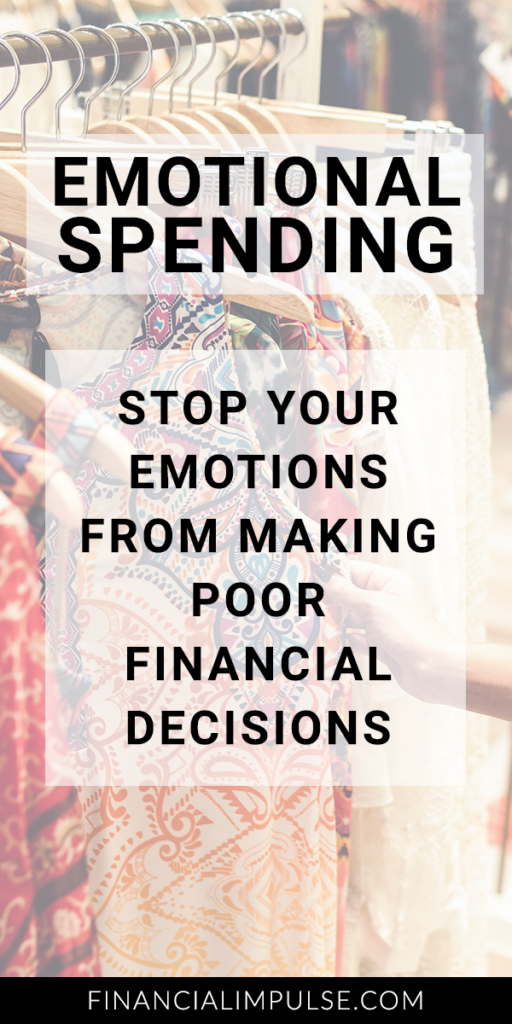Do your emotions ever drive you into making poor financial decisions? Maybe it’s time to get to the root of it.
If humans didn’t have emotions, can you imagine how our financial decisions would look?
We’d make spending, saving, and investment choices based purely on logic and reason. Would this mean stronger financial outcomes in the long run? Maybe it would, maybe it wouldn’t—it’s an interesting hypothetical.

For some people, emotions aren’t much of an issue when it comes to decision-making about their personal finances.
But for others, they can lead to emotional spending and other poor financial moves.
Although people commonly associate emotional spending with feeling sad or stressed, there are many more emotions that can impact how we make financial decisions, including:
- Anxiety
- Boredom
- Excitement
- Fear
- Jealousy
- Guilt
If feeling any of these has led you to some impulsive decisions with money, now’s the time to work on getting these tendencies under control.
Why do emotions affect our financial decisions?
Put simply, we’re not rational creatures.
Emotional spending or poor financial decision-making can be triggered by a wide variety of events, including:
- Friends discussing plans for an expensive holiday together
- Getting a notice of rent increase from your landlord
- An invitation to join someone’s bridal party or groomsmen—and being expected to shoulder its accompanying costs
- A loved one’s birthday approaching
- Seeing a newly released product from your favorite brand
- Being solicited by a door-to-door fundraiser or a friend asking for donations
These incidents can trigger anything from excitement to jealousy to guilt to something else—and make you feel compelled to act on impulse. And we act especially when we feel social pressure. That could be from any source, like an expectant landlord or friends who want to have a night out together.
How to better deal with your emotions when it comes to finances
Wrangling your emotions to better deal with money is no easy battle, but it’s necessary to get your money habits under control. Here’s how to better deal with your emotions when it comes to managing your finances.
Recognize your emotions

There’s strength in being able to identify and label how you’re feeling. If you can pinpoint your exact emotions, you tend to be better prepared to regulate and address them.
Sound silly? It’s not.
The concept, also known as emotional granularity, has been the subject of various psychological studies—many of which show that it’s useful for managing your emotions when faced with major challenges.
Applied to your finances, that could be realizing that you’re more inclined to indulge in retail therapy after dealing with your in-laws or before a performance review at work. In any case, by being able to identify your emotional trigger, you’ll be in a better position to find another outlet for when such a situation arises.
Create a budget—and stick to it
Sometimes we call it “treating ourselves”—and by all means, we are certainly entitled to enjoying what we earn, not just squirreling it away for emergencies or retirement. But when this becomes a habit of overspending and you find your savings dwindling, it’s time to set limits.
And creating a budget is the perfect way to get started.
Get your credit card statements together and review them for areas of excess. Identify the expense categories you have a tendency to go overboard in and set hard limits.
Of course, budgets are only effective if you can stick to them. That means, if you’re new to budgeting, it’s best to avoid more drastic plans like minimalist budgets. Be realistic about your financial goals—you can start out by saving less per month and increasing that amount over time.
Take a breath and look at the big picture
It’s hard to avoid acting in the heat of a moment, but exercising some of your willpower to do so can help you react when feeling some intense emotional stimulation.
Take a step back and try to think more logically about the situation. Give yourself time to digest and process a situation first rather than acting immediately.
For example, perhaps your friends approach you about planning a trip out of town in a few weeks. Though the thought may excite you, this month’s finances are a question mark. Rather than RSVP yes right away, it helps to pause and tell your friends you can’t commit just yet. That way, you can make a more clear-headed decision after reviewing where you stand financially.
Find a channel for catharsis

First used by Aristotle, catharsis refers to a release of emotion that creates a sense of relief. In simple terms, finding a channel for catharsis means finding a healthy emotional outlet.
That could be meditating, pursuing art or music, going to the gym, or something else that can help clear your head when some other emotion absorbs all or most of your attention.
For instance, if work stress makes you want to spend more than you should at a bar after work, try exercising or finding some other hobby to focus on instead. You may even find that outside of therapeutic relief, pursuing this activity can lead to additional benefits, e.g., better health, or a new side hustle.
Reduce your social media consumption
In some cases, it may be helpful to limit the amount of time you spend browsing Facebook, Instagram, or any other social network that inspires temptation. Seeing friends’ posts, or even advertisements, can often fuel envy or desire, making you more inclined to spend, whether it’s on a specific product or experience.
This can also be applied to magazines or other forms of media that drive a desire to buy. Cancel these subscriptions, and try immediately deleting emails that advertise BOGO sales and discounts in your inbox.
Consider a financial therapist
Yes, it’s really a thing and there’s nothing wrong with consulting one.
The stress of personal finance can be overwhelming for some people and inadvertently aggravate their financial situation further. It doesn’t help that talking about money is largely taboo, with the potential to lead to uncomfortable situations.
That’s why talking to a financial therapist can help. These trained professionals offer a judgment-free space to speak openly about money woes and frustrations, and they can also help you better process the emotions driving any major financial decision.
Conclusion
Our emotions can often shape and impact how we decide to spend our money, for better or worse. And it’s not limited to anyone based on age or gender—anyone can act less responsibly with just the right trigger.
Fortunately, you can get your rational side back into the game. Practice the tips above to build a better habit of budgeting and cooling down before acting on impulse.
Do you ever take part in emotional spending? What are your triggers for spending more than you mean to?






Oof great article. I do this way too much.
This is a great reflective piece. The content here can apply to so many people and is easy to overlook! Thank you for the reminder to pause and reflect in order to find the true driver of our choices.
Thank you for your kind words!